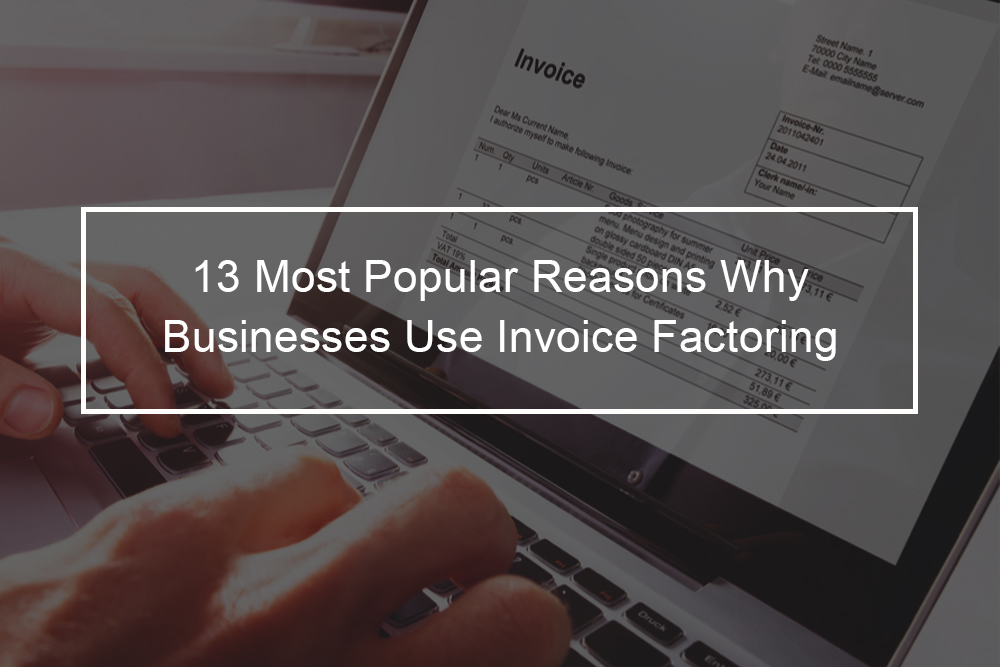When your mid-sized or small business company requires working capital with fast or flexibility financing, factoring companies offer required cash flow. A factoring company relieves you the burden of waiting for accounts receivable invoice payments and, in turn, offers your business a timely cash advance. This receivable financing is a fast and flexible financing alternative to traditional bank business loans. Many also refer to receivables financing as invoice factoring.
Invoice factoring is when an accounts receivable invoice is essentially sold at a discount by your business to a factoring company. Factoring is usually referred to as a factor. Banks traditionally need a burdensome approval procedure to loan money. That loan will have an interest based on debt for a business and market-driven interest rates. Reputable factors begin approval within twenty-four hours and provide same-day financing or up to ten days for a new customer without subjecting your business to the volatility of banking interest rates and avoiding debt on your company’s books.
Why do companies use factoring?
Businesses can benefit from utilizing factoring in the following situations
Boost cash flow from slow-paying customers
The most common reason to utilize factoring is to improve cash flow as a result of slow-paying customers. Slow payments can result in persistent cash flow issues for the business. These issues can get worse if the business is growing faster. Factoring their accounts, receivable offers companies with immediate cash for their invoices. This funding gets rid of the cash flow problem and offers the liquidity to meet payroll and fund other expenses.
Startups, new companies, small companies
Cash flow issues can impact companies of any size. But smaller and newer companies do not have the traditional options available to larger companies. Factoring can be a great alternative. It is simple to qualify for and can be used by small companies. The main criterion for eligibility is the credit quality of your clients. New or small companies with great customers can often get funded
Turnaround situations
Getting financing while trying to turn around a troubled business is a major problem for management. The business’s financial statements often do not appear good enough to get bank funding. Sadly, this time is when they require financing the most. Receivables factoring can often assist businesses that are going through a turnaround. It offers a cash flow lifeline that allows the company to improve and become profitable again. Usually, the company can get a business line of credit (or similar product) – once the situation improves.
Factoring enables companies to bring in cash without taking on new debt
Debt can be a beneficial tool to sustain and build a business. Nonetheless, it can also be risky, mainly for new companies. Factoring enables companies to receive badly needed capital without relying on a costly loan.
Factoring can assist companies that have an understaffed collection department or no collection department at all
A factoring company can offer a much-needed service for businesses that do not have a collection department or enough personnel. Invoice factoring can offer them what they require (money) to survive and expand by advancing money for their invoices and then collecting them. The seller will have to pay for these services; however, it is well worth it for many businesses.
Unable to qualify for a line of credit/ loan
Loans and business lines of credit are the cheapest types of financing available to most businesses. And, in most cases, they are the best options for a company. Getting conventional bank funding is difficult. Lenders offer to fund only to businesses that have solid financials and a good track record. Moreover, lenders also shy away from fields they deem “risky.” These industries include construction and transportation, among others.
Receivables factoring is an option for businesses that can not get conventional financing. It has simple qualification requirements. To qualify, you must have:
- Creditworthy commercial clients
- Good invoicing practices
- Good managers
Because of a covenant with current lenders
Loan covenants can make it challenging to maintain a credit or loan line – even for good businesses. Banks usually use conservative covenants that do not offer the flexibility some businesses require. For instance, seasonal companies usually run into issues with their covenants. There is nothing wrong with the business, per se. It is just that their financials do not look as good during the slow period as they should. This “seasonality” makes them fall out of covenant on their financial ratios. Invoice factoring can be a good solution for businesses that run into this problem. Most factoring lines have no (or minimal) covenants. Those that do have covenants have flexible rules that can accommodate most situations.
Less-than-perfect credit
Most lending institutions provide financing only to companies whose business owners have good personal credit. This practice is understandable; however, it leaves everybody else out of the running. Factoring companies have much more lenient requirements. They center more on the quality of the company, instead of the owners’ credit. Businesses whose owners have “less-than-perfect” credit can usually qualify for factoring.
Tax challenges
Tax issues or liens filed against a business present a challenge when it comes to funding and cash flow. Banks are unwilling to lend to a company that has a tax lien. Most factoring companies have extensive experience working with government agencies to set up plans to resolve tax liens. Accounts receivable factoring will provide the cash flow needed to continue operating and growing the business while solving tax lien situations.
Recent bankruptcies
Most lenders do not offer to fund companies that have a recent bankruptcy. This is a challenging case for these businesses since funding is often critical. Factoring companies can provide funding in many post-bankruptcy situations. The company must still meet the requirements for factoring, though.
Better customers
The majority of factoring companies will have access to day-to-day information and credit data on companies that may become your clients. Some factors even have their own ranking systems for businesses in your industry. This resource enables you to make informed, calculated decisions about new and existing customers.
Seasonal businesses that need cash for the slow periods
If your business operations are cyclical, it is even more essential to have available money when the work slows down. Invoice factoring is flexible; thus, you can factor when you require the money most – during the busy season to stockpile funds or during slow periods to meet ongoing expenses.
They are now able to negotiate lower prices
These companies can now try to negotiate lower prices with their suppliers because of the new influx of cash that allows them to purchase more products and make early payments. These businesses can now lower their own prices to match competitor prices since they’re no longer waiting for customer payments. In a nutshell, companies that often benefit from factoring financing include those that often face business situations, such as:
- financing needed to maintain substantial materials for production or inventory
- volatile cash flow
- long-duration sales cycles
- slow-paying clients, like large corporations, government agencies, or buyers
- seasonal sales.
Factoring also fuels your business growth when your company is presented with opportunities, like:
- urgent or unanticipated customer demand for services or products
- timely opportunities to expand into emerging markets
- innovations that provide an opportunity to invest in equipment and new technology
- options to expand offices, production workspace, or inventory warehousing.
How does factoring offer security for accounts receivable and business finances Management?
Typically a factor advances 70-percent to 90-percent of the amount of an invoice to your company upon confirmation of your billed client’s credit-worthiness. After your customer pays an invoice in full, the factor will pay your business the balance due to the invoice once it retains any transaction expenses.
To pros from the advantages of receivables financing, the factoring agreement between your business and the factor will, undoubtedly, define terms and incur fees, like:
- the rate at which financing will be advanced to your business against the net amount of your client’s invoice
- a pre-established maximum amount of money available to be advanced, also called, the initial factoring line
- Discount fee, or factoring fees, depending on a percentage rate of the value of the factored accounts receivable and variable following invoice terms
- length of duration of the factoring arrangement.
- any necessary fees, charges, and terms, to alleviate risks and cover costs for management and administration of the invoice factoring arrangement
A factoring arrangement with a long-standing, credible factoring company offers your business many valuable benefits such as:
- maintenance of ledger (accounts) related to factored receivables
- Protection of your business against default by account debtors with a kind of factoring known as non-recourse. Indicating, the factor takes on the risk of nonpayment for invoices due to the account debtor’s financial inability to pay.
- collection of receivables
- Accounts receivable credit protection against account debtor bankruptcy.
Invoice factoring is a great solution for many financial issues experienced by businesses of all sizes from across many industries. Typically, small to medium-sized businesses are the most common users of invoice factoring.











